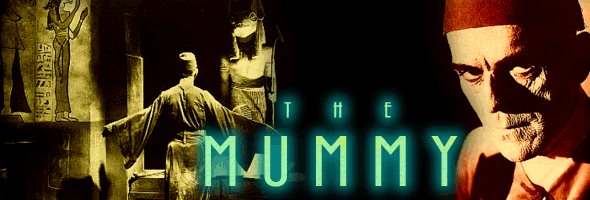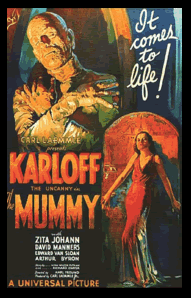
B&W, 1932, 74 mins. Directed by Karl Freund
Starring Boris Karloff, Zita Johann, David Manners, Bramwell Fletcher, Artur Byron, Edward Van Sloan / Produced by Carl Laemmle, Jr. / Cinematography by Charles J. Stumar
Format: DVD - Universal (MSRP $29.98)
A group of not terribly bright archeologists, including the "hero," Frank (David Manners), uncover an Egyptian burial structure and, ignoring the warnings plastered all over the coffin, open up the tomb of Im-Ho-Tep, who promptly comes to life and "goes for a little walk." Ten years later, Ardath Bey arrives and establishes a hypnotic rapport with Helen (Zita Johann), the reincarnation of his lost Egyptian love.
While Universal usually had some kind of source material from which to draw its monstrous visions, The Mummy had to be fabricated from scratch following the national craze for all things Egyptian (King Tut's tomb in particular). Universal fans who complained about the sterility of their digitally restored soundtrack for Frankenstein should have no cause for complaint here, as this Mummy sounds pretty much like it always has. While the soundtrack is always intelligible and usually fairly crisp, it still possesses that faint, familiar background rumble prevalent in most '30s titles. The image quality fares better; though not as immaculately restored as some other recent efforts, the depth of the shadows and precision of detail are noticeably improved over Universal's outdated VHS and laser editions. The transfer is generally impressive and, for the most part, quite clean; only a few bumpy real changes and a couple of jagged scene edits betray that this has been taken from a print. As befits a classic, Universal has decked this out with a host of supplementary features, including David J. Skal's half hour Mummy Dearest documentary, hosted by Rudy Behlmer, and Paul M. Jensen's informative commentary track. Both historical tours provide some fascinating behind the scenes tidbits including details on Karloff's make up by the legendary Jack Pierce (Rick Baker appears to make a few comments) and the origins of Cagliostro, the unfilmed Karloff project which this replaced. All in all, Universal has once again demonstrated an admirable level of respect for the classics upon which the studio was built, and hopefully more of Karloff's Universal titles will be on the way.
A solid entry in the Universal monster movie sweepstakes, The Mummy has fallen victim over the years to countless misconceptions from the wave of fake sequels and remakes. While Boris Karloff does indeed make his initial appearance in the film in Im-Ho-Tep mummy garb (a fantastic sequence and one of horrordom's finest), the majority of the tale finds him resuscitated in human form (albeit a little strange looking) as Ardath Bey.
 Not really a traditional monster film, The Mummy is more of a dark supernatural romance in which one of the characters happens to be a few thousand years old.
Not really a traditional monster film, The Mummy is more of a dark supernatural romance in which one of the characters happens to be a few thousand years old.
 Interestingly, though few seem to notice, it is also one of the most sexually suggestive and perverse films of its era, with Manners' bizarre seduction of Helen prefiguring an even more open-ended flashback in which viewers are allowed to see why high priest Karloff was punished for doing "unspeakable" things in his love's tomb. Fortunately, taste and tact prevail, unlike the studio's Murders in the Rue Morgue, which gleefully showed almost everything but failed to establish the overwhelming sense of morbid passion exhibited here. Karloff makes an excellent "romantic" figure, while Edward Van Sloan appears in yet another variation on his Van Helsing character. The two "straight" romantic leads fare less successfully, though Johann looks great in her quasi-Egyptian garb. The real star is unquestionably the director, Karl Freund, an exceptional cinematographer for such directors as F.W. Murnau and Fritz Lang who went on to do one more horror film, the stunning Mad Love, before revolultionizing the sitcom three-camera setup on I Love Lucy. Freud's poetic eye, previously seen in Tod Browning's Dracula, brings an austere sense of beauty to the most mundane scenes and carries along a film that could have easily become a dull talkfest. Numerous other films made the mistake of keeping the mummy under wraps for the entire running time, with only Terence Fisher's 1958 version for Hammer managing to pull off this trick with any degree of success. Fortunately, Stephen Sommers' 1999 remake for Universal wisely focused on the mummy as a supernatural, lovestruck entity perfectly willing to shed his bandages in his quest for eternal romance and vengeance.
Interestingly, though few seem to notice, it is also one of the most sexually suggestive and perverse films of its era, with Manners' bizarre seduction of Helen prefiguring an even more open-ended flashback in which viewers are allowed to see why high priest Karloff was punished for doing "unspeakable" things in his love's tomb. Fortunately, taste and tact prevail, unlike the studio's Murders in the Rue Morgue, which gleefully showed almost everything but failed to establish the overwhelming sense of morbid passion exhibited here. Karloff makes an excellent "romantic" figure, while Edward Van Sloan appears in yet another variation on his Van Helsing character. The two "straight" romantic leads fare less successfully, though Johann looks great in her quasi-Egyptian garb. The real star is unquestionably the director, Karl Freund, an exceptional cinematographer for such directors as F.W. Murnau and Fritz Lang who went on to do one more horror film, the stunning Mad Love, before revolultionizing the sitcom three-camera setup on I Love Lucy. Freud's poetic eye, previously seen in Tod Browning's Dracula, brings an austere sense of beauty to the most mundane scenes and carries along a film that could have easily become a dull talkfest. Numerous other films made the mistake of keeping the mummy under wraps for the entire running time, with only Terence Fisher's 1958 version for Hammer managing to pull off this trick with any degree of success. Fortunately, Stephen Sommers' 1999 remake for Universal wisely focused on the mummy as a supernatural, lovestruck entity perfectly willing to shed his bandages in his quest for eternal romance and vengeance.
